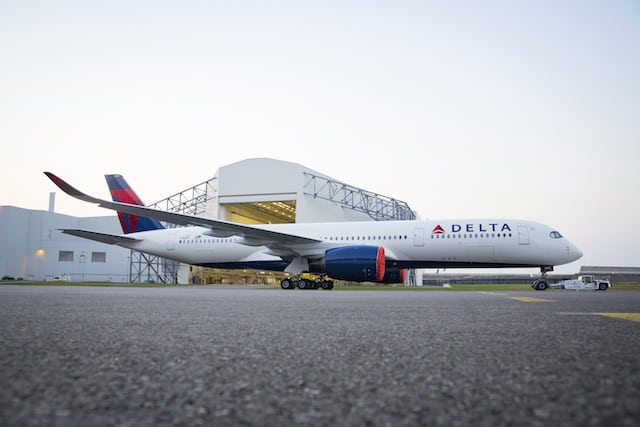
Delta Air Lines Airbus A350. Photo courtesy of Airbus
Delta Air Lines spent $500 million on new aircraft and existing aircraft modifications in the second quarter of 2017. During the international carrier’s second quarter earnings call, executives discussed further fleet modernization initiatives and their new position on U.S. lawmakers efforts to launch a new air navigation service provider (ANSP) for the National Airspace System.
Fleet Investment
According to Delta Air Lines CEO Ed Bastian, the airline has replaced 25% of its total fleet over the past five years and plans to replace another 20% by 2020. Over the next three years, Delta will also retire its fleet of MD-88s, and Bastian noted that its Boeing 747 fleet is “going out this year as well.”
The remainder of 2017 will see Delta continue to take deliveries of Boeing 737-900s and Airbus A321s to replace older narrow body aircraft within its fleet. Delta is also the U.S. launch customer of the Bombardier C Series aircraft, resulting from a 2016 $5.6 billion order for 75 CS100s. Since 2009, Delta has retired 280 50-seat regional jets and more than 130 older, narrowbody aircraft, while refreshing its fleet with more than 300 aircraft.
By the end of the year, Delta will also look to complete its investment in Aeromexico.
“For the September quarter, we again expect capital expenditures of approximately $1 billion, including $175 million to complete the purchase of 49% of Aeromexico,” said Paul Jacobson, CFO for Delta.
In terms of fleet modification, one of the technologies in which Delta has recently invested is the development of a new app that allows pilots to use a combination of aircraft connectivity and avionics sensors technology to avoid areas of turbulence while flying. The app, called “Flight Weather Viewer,” was launched in beta-testing mode in 2016 and is capable of providing pilots with real-time graphics of turbulence observations and forecasts on the flight deck.
“On board, we’re investing in reliable high-speed Wi-Fi, upgraded interiors, in-seat entertainment and improve food and snacks,” said Glen Hauenstein, Delta’s president.
The airline also recently equipped its 500th aircraft with new seat-back in-flight entertainment technology from Panasonic Avionics and took delivery of its first Gogo 2KU-equipped Airbus A350. Delta is also the first airline in North America to begin operating the A350.
ATC Reform
Over the past two years, U.S. lawmakers have been proposing a separation of the FAA’s role as the U.S. aviation safety regulator, from its role as the nation’s ANSP. The proposal, which has gained momentum under the new administration, has divided the aviation community between commercial airlines in support of it and business and general aviation operators opposed. Throughout that time, Delta has been the only major carrier expressing opposition to such reform.
However, during the second quarter earnings call, Bastian expressed a different position toward air traffic reform.
“We’re not philosophically opposed to privatization for privatization sake. What we want to do is make certain that we have the proper governance, transparency and cost efficiency to drive the reforms needed in the next air traffic control system that gets modernized,” said Bastian. “We’re in full support of the president’s agenda to invest and modernize the systems.”
That represents a shift from public statements Delta has made in recent years, including a study released in 2016 showing how U.S. consumers in Canada faced a 59% increase in air traffic control fees on airline tickets when Canada shifted to a new ANSP. That study also predicted any introduction of a new ANSP in the U.S. would lead to increased prices for airline tickets.